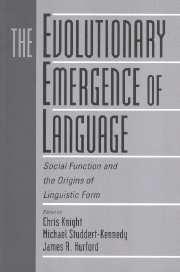Book contents
- Frontmatter
- Contents
- Contributors
- Acknowledgements
- Language: A Darwinian Adaptation?
- Part I The Evolution of Cooperative Communication
- 1 Introduction: The Evolution of Cooperative Communication
- 2 Comprehension, Production and Conventionalisation in the Origins of Language
- 3 Cooperation, Competition and the Evolution of Prelinguistic Communication
- 4 Language and Hominid Politics
- 5 Secret Language Use at Female Initiation: Bounding Gossiping Communities
- 6 Play as Precursor of Phonology and Syntax
- Part II The Emergence of Phonetic Structure
- Part III The Emergence of Syntax
- Epilogue
- Author Index
- Subject Index
1 - Introduction: The Evolution of Cooperative Communication
Published online by Cambridge University Press: 24 November 2009
- Frontmatter
- Contents
- Contributors
- Acknowledgements
- Language: A Darwinian Adaptation?
- Part I The Evolution of Cooperative Communication
- 1 Introduction: The Evolution of Cooperative Communication
- 2 Comprehension, Production and Conventionalisation in the Origins of Language
- 3 Cooperation, Competition and the Evolution of Prelinguistic Communication
- 4 Language and Hominid Politics
- 5 Secret Language Use at Female Initiation: Bounding Gossiping Communities
- 6 Play as Precursor of Phonology and Syntax
- Part II The Emergence of Phonetic Structure
- Part III The Emergence of Syntax
- Epilogue
- Author Index
- Subject Index
Summary
‘Selfish gene’ Darwinism differs from earlier versions of evolutionary theory in its focus on one key question: Why cooperate? The faculty of speech which distinguishes Homo sapiens from other species is an aspect of human social competence. By inference, it evolved in the context of uniquely human strategies of social cooperation. In these chapters, therefore, Darwinism in its modern, socially aware form provides our theoretical point of departure.
Where, previously, attention has focused on speech as the biological competence of individuals, here our themes are social. To study communication is inevitably to study social structure, social conflict, social strategies, social intelligence. Communication, as Robbins Burling observes in the next chapter, ‘does not begin when someone makes a sign, but when someone interprets another's behaviour as a sign’. Reminding us of this elementary principle, Burling spells out the logical corollary: where the evolution of language is concerned, it is comprehension, not production, which sets the pace. Even a purely instrumental action, after all, may be read by others as a signal. Where this has evolutionary significance, instrumental behaviour may then undergo modification in the service of novel, socially conferred, signalling functions. Chomsky's focus upon the innate creativity of the speaker has been enormously productive. But over evolutionary time, Burling points out, ‘the only innovations in production that can be successful, and thus consolidated by natural selection, are those that conform to the already available receptive competence of conspecifics’.
- Type
- Chapter
- Information
- The Evolutionary Emergence of LanguageSocial Function and the Origins of Linguistic Form, pp. 19 - 26Publisher: Cambridge University PressPrint publication year: 2000
- 4
- Cited by

